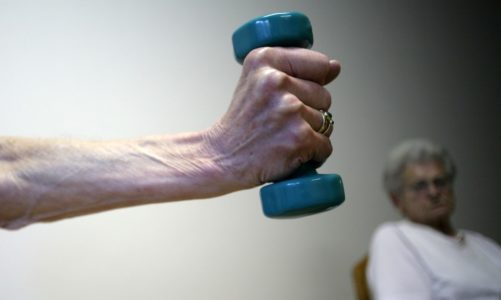
Cindy Krischer Goodman | South Florida Sun-Sentinel
In the nation’s emergency rooms, strokes are regularly misdiagnosed, but now Florida International University researchers have created an algorithm to diagnose this medical condition more quickly and accurately.
The FIU-created algorithm uses hospital data and social determinants of health data such as age, race and underlying conditions to diagnose a stroke even before the results of laboratory tests or diagnostic images are available. The researchers believe currently used pre-hospital stroke scales miss about 30% of cases.
With stroke diagnosis, there is a critical window. Patients who are treated within an hour of the onset of symptoms have a much greater chance of surviving and avoiding long-term brain damage. FIU researchers say their machine learning algorithm, if used by emergency department care teams, would improve the patients’ medical outcome by allowing doctors to make better and faster decisions.
The FIU study, published in the January 2023 issue of the Journal of Medical Internet Research, outlines how researchers used emergency department and hospitalization records from Florida hospitals from 2012 to 2014 and merged with the data from the American Community Survey. Their analysis included 143,203 hospital visits of unique patients. Patients who ended up being diagnosed with stroke tended to be older, have more chronic conditions and have Medicare as the primary payer.
“Our algorithm can incorporate a lot of variables to analyze and interpret complex patterns,” said Min Chen, one of the FIU researchers.
This type of machine-learning technology is undergoing pilot testing in the ERs of several large healthcare systems.
Broward Health Medical Center opens robotic lab for heart rhythm disorders
Millions of Americans suffer from arrhythmias — abnormal heart rhythms that happen when the heart beats too quickly, too slowly, or with an irregular pattern.
Broward Health Medical Center in Fort Lauderdale has opened a Cardiac Electrophysiology Lab that uses new robotic technology to treat arrhythmias.
The technology, Genesis Robotic Magnetic Navigation System, allows surgeons to use robotic precision when doing cardiac ablation, a common, minimally invasive procedure. Broward Health is the first in Florida to have this robotic device. A spokeswoman for Broward Health said the lab treated its first patient using the technology last week.
In a written statement, Stereotaxis, the manufacturer of the Genetic Robotic Magnetic Navigation System, said more than 1,000 cardiac arrhythmia patients at eight hospitals have been treated using its robotic technology.
Lynn Cancer Institute gets cutting-edge radiation device for cancer treatment
Even the smallest movement such as breathing or swallowing can change the position of a tumor and affect radiation for cancer treatment.
The Eugene M. & Christine E. Lynn Cancer Institute in Delray Beach has a new device to treat cancer patients that can target radiation more precisely and in real time.
The ViewRay MR-Guide Radiation Therapy System uses MRI technology to allow doctors to deliver treatment radiation beams and see the internal anatomy and tumor at the same time. In some cases, the patient can help the doctor by guiding the tumor into the right location with breathing. By using the new system, doctors can adapt a patient’s radiation treatment plan based on what they see each day.
Getting the correct amount of radiation to the correct location reduces the amount of exposure to surrounding organs and lessens potential side effects.
“The MRIdian-Smart innovation will revolutionize our approach for radiation in Palm Beach and deliver saving care, particularly for patients with difficult to treat pancreas and liver tumors,” said Dr. Michael Kasper, medical director of radiation oncology at Lynn Cancer Institute.
Baptist Health, which owns the Lynn Cancer Institute, also has a MR-Guide Radiation Therapy System at its Miami Cancer Institute.
Cleveland Clinic Weston opens The Center for Human Nutrition
Cleveland Clinic Weston has opened a specialized center for people with nutritional deficiencies caused by gastrointestinal diseases.
At the new Center for Human Nutrition, doctors, registered dieticians and dietetic technicians take a team approach to provide nutritional evaluation, education and treatment to patients. People who would benefit have illnesses such as celiac disease, inflammatory bowel disease, malabsorptive disorders, short bowel syndrome, digestive fistulas, cirrhosis and Crohn’s disease.
For those who are unable to be seen in person, dietitians and clinicians at the new center also offer outpatient video visits to help minimize malnutrition-related complications.
Gastroenterologist Andrew Ukleja is the director of The Center for Human Nutrition at the Weston hospital. His specialty interests include parenteral and enteral nutrition, as well as gastrointestinal, pancreatic and liver disorders.
Cindy Goodman covers health for the South Florida Sun Sentinel. Send her your healthcare innovation news at cgoodman@sun-sentinel.com. Make sure to type What’s Hot in Healthcare in the subject line of your email.
©2023 South Florida Sun-Sentinel. Visit sun-sentinel.com. Distributed by Tribune Content Agency, LLC.
𝗖𝗿𝗲𝗱𝗶𝘁𝘀, 𝗖𝗼𝗽𝘆𝗿𝗶𝗴𝗵𝘁 & 𝗖𝗼𝘂𝗿𝘁𝗲𝘀𝘆: www.mercurynews.com
𝗙𝗼𝗿 𝗮𝗻𝘆 𝗰𝗼𝗺𝗽𝗹𝗮𝗶𝗻𝘁𝘀 𝗿𝗲𝗴𝗮𝗿𝗱𝗶𝗻𝗴 𝗗𝗠𝗖𝗔,
𝗣𝗹𝗲𝗮𝘀𝗲 𝘀𝗲𝗻𝗱 𝘂𝘀 𝗮𝗻 𝗲𝗺𝗮𝗶𝗹 𝗮𝘁 dmca@enspirers.com




